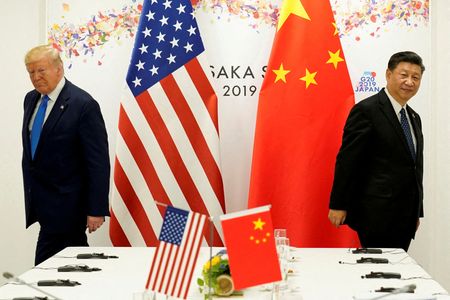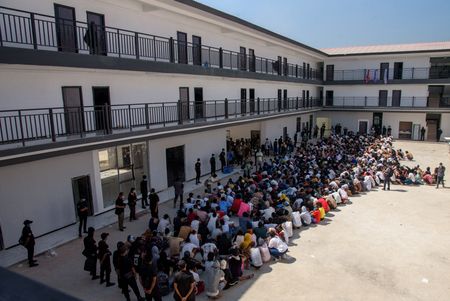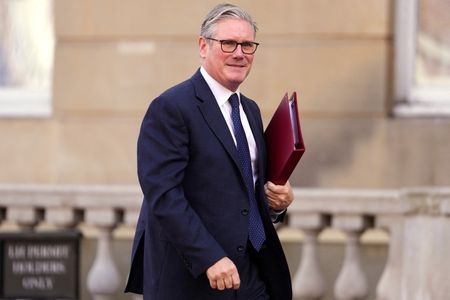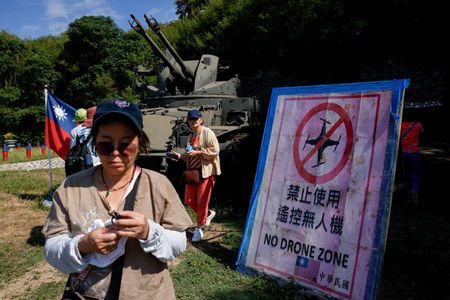(Corrects to restore headline tag)
By Laurie Chen, Michael Martina and Karen Freifeld
BEIJING/WASHINGTON/NEW YORK (Reuters) -Just a month after U.S. President Donald Trump hailed “progress” in talks with China, the world’s two most powerful nations are scrambling to salvage a planned summit of their leaders, now just a week away, while trading blame for a spike in tension.
Even if the talks between Trump and President Xi Jinping can be put back on track, experts say each side’s belief that it has the upper hand, coupled with China’s tougher posture, makes a narrow deal on a few issues the most likely outcome.
“China believes negotiations alone are insufficient and that effective countermeasures against the United States are necessary to prevent the U.S. from exerting pressure,” said Wu Xinbo, an expert on ties between the two biggest economies.
At risk are a fragile truce negotiated over months and the world’s most important trade relationship, worth $660 billion a year.
“China’s recent measures actually reflect a shift in its approach to economic and trade negotiations with the United States during Trump’s second term,” added Wu, director of the American Studies Center at Shanghai’s Fudan University.
A trade war simmering for months exploded into full view in early October, after Beijing dramatically expanded curbs on exports of rare earths, in response to a U.S. hike in the number of firms blocked from purchases of its technology.
China’s move to tighten control over critical minerals, even beyond its borders, was a vast expansion of its toolkit for tackling trade disputes, underscoring Beijing’s intent to wield its dominance over vital supply chains, experts say.
“This is a huge expansion of extraterritorial jurisdiction,” said Cory Combs, an expert at consultancy Trivium China. “There is surprisingly explicit language in the controls about this, specifically targeting a number of chips.”
China, which turns out more than 90% of the world’s processed rare earths, modelled its curbs on U.S. rules aimed at limiting other countries’ exports of semiconductor-related products to the Asian nation.
The Trump administration was surprised by China’s salvo, said two sources familiar with its internal deliberations. Another source said officials were canvassing U.S. companies to see how China’s measures would affect them.
Experts say that while Beijing subsequently sought to portray its controls as targeted, the framework had been prepared for a long time and would almost certainly remain.
Officials in Washington accuse China of waging “economic war”, Trump has warned the meeting might not happen, and each side blames the other for a sudden escalation.
It is a far cry from Trump’s comments hailing “progress” on issues ranging from trade and TikTok to fentanyl smuggling and the Ukraine war, made after the latest round of talks in Madrid and a September telephone call with Xi.
‘ECONOMIC WAR’
Trump has said he continues to plan on meeting Xi in South Korea at the end of October on the sidelines of the Asia-Pacific Economic Cooperation gathering and expects to reach a deal, but reiterated his threat of 100% tariffs if it was not successful.
Seeking a last-minute off-ramp, U.S. Treasury Secretary Scott Bessent and Chinese Vice Premier He Lifeng will meet in Malaysia just days before.
The meetings follow tough negotiations in European capitals from Geneva to Stockholm over trade, fentanyl, market access, and other aspects of ties, after which both sides traded accusations that the other did not stick to its promises.
Trump’s cabinet secretaries view China’s move on rare earths as “full-blown economic war”, said a person familiar with the administration’s thinking.
“The prospect for escalation is severe,” the person added. “There isn’t an easy fix, like another 90-day pause.”
The White House and U.S. Treasury Department did not respond to Reuters’ requests for comment. China’s foreign and commerce ministries did not immediately respond to a request for comment.
Part of the challenge is that each side believes it has the upper hand, said Michael Hart, the president of the American Chamber of Commerce in China.
“In our discussions with Chinese officials, they express confidence in their economy and believe the U.S. economy and political system are in turmoil. As a result, they feel they are in a strong bargaining position,” said Hart.
Negotiations are challenging, he added, because U.S. officials in turn feel confident about their own economy and believe the Chinese economy is weak.
‘FLEXIBLE AND PRAGMATIC’
Washington’s lack of a unified China policy complicates matters, said people familiar with the administration’s thinking, citing the mix of punitive measures but also easing on some chip sales and the deal on social media app TikTok.
“People I have met in D.C. made it clear the Trump administration’s policies on China are fairly hawkish,” said Hart. “However, they also acknowledged the president himself can sometimes be more flexible and pragmatic.”
While both sides prepare for talks, they are also diversifying their economies and developing new measures.
Trump signed a critical minerals pact with Australia on Monday that aims to offset Beijing’s role, while Reuters reported on Wednesday that the United States is considering targeting software-powered exports.
Officials say extensive sectoral tariffs are also being drawn up for semiconductors, pharmaceuticals and other key industries.
China, for its part, could resort to aggressive enforcement of its new rare earths controls, launch fresh antitrust investigations into U.S. companies, or beef up tariffs, as it did in April.
Amid the mistrust, an optimistic scenario would be a follow-up to the Phase One deal of 2020, said one person familiar with the administration’s thinking, although deals to buy soybeans or other farm products could be within easier reach.
“The best-case scenario is confidence-building measures and more directives to negotiate a deal that could be launched in the first half of next year,” said Peter Harrell, an international economics official in the Biden administration.
(Additional reporting by Trevor Hunnicutt and David Brunnstrom in Washington; Editing by Antoni Slodkowski and Clarence Fernandez)











